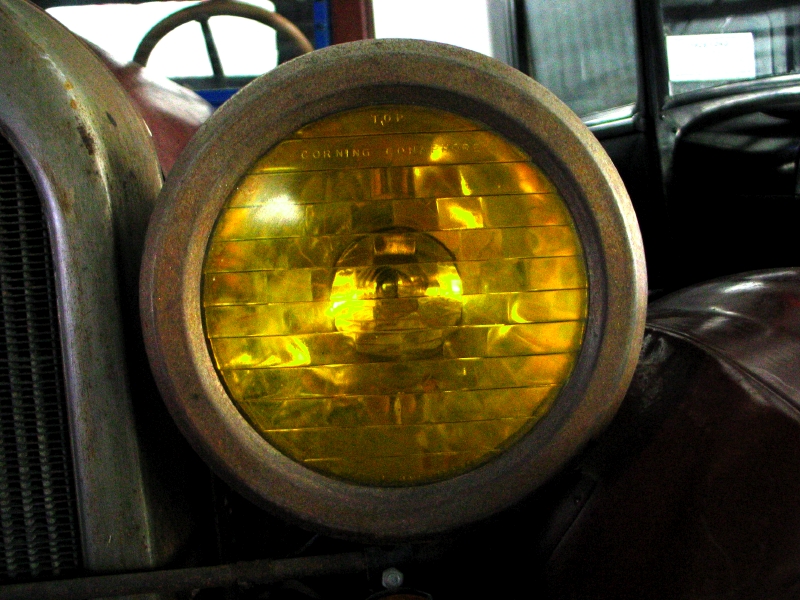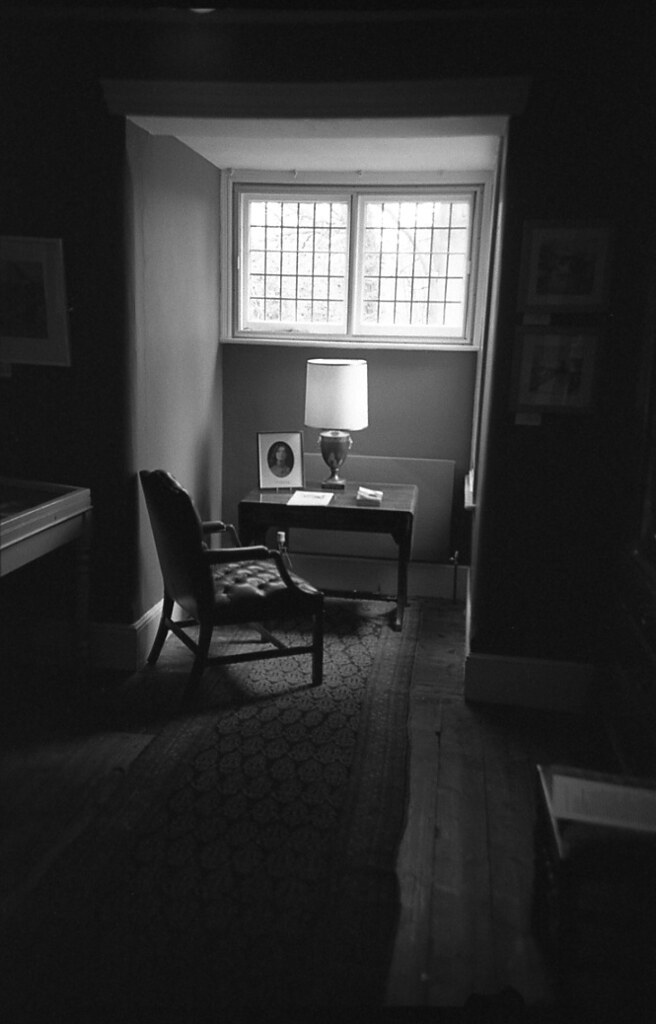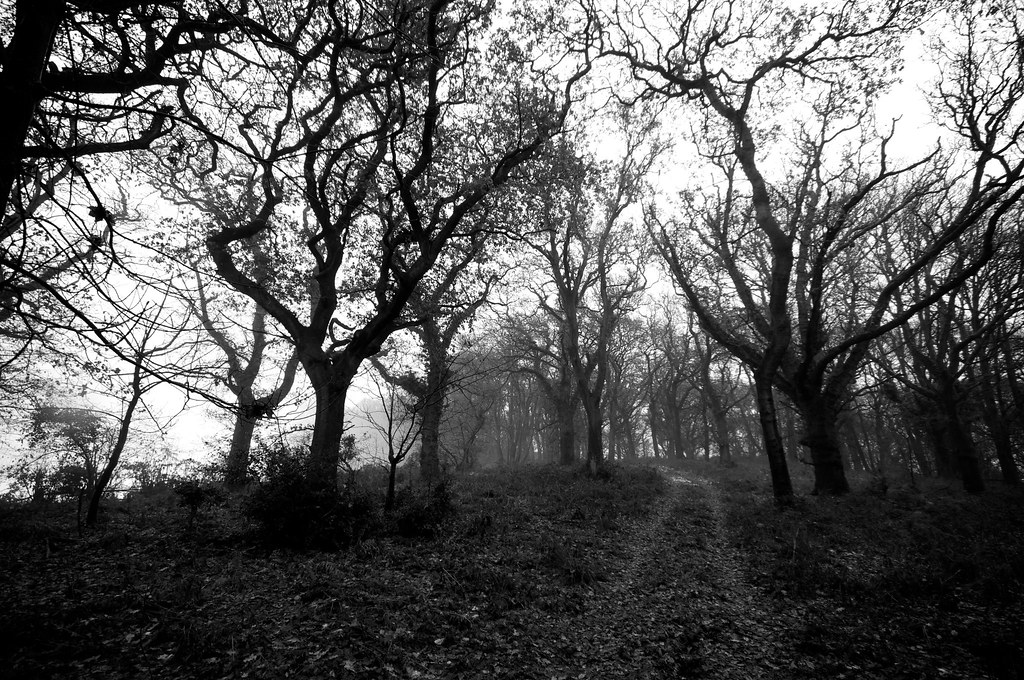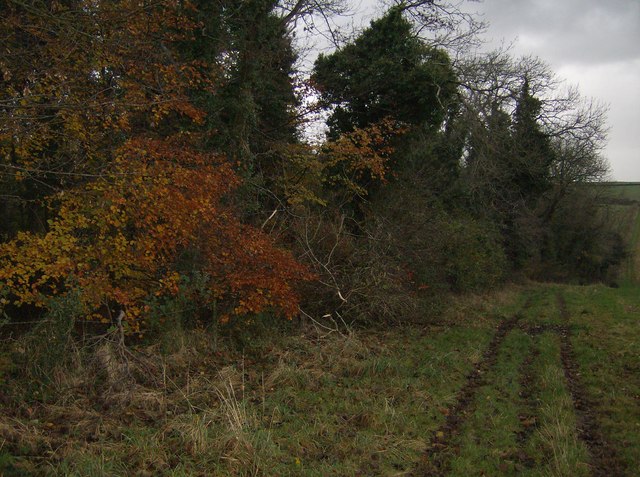.

Early automotive headlamp equipped with Corning Conaphore lens: photo by Schweinwerfermann, 21 December 2007
.....Tree-leaves labour up and down,
..........And through them the fainting light
..........Succumbs to the crawl of night.
.....Outside in the road the telegraph wire
..........To the town from the darkening land
Intones to travelers like a spectral lyre
..........Swept by a spectral hand.
..........And through them the fainting light
..........Succumbs to the crawl of night.
.....Outside in the road the telegraph wire
..........To the town from the darkening land
Intones to travelers like a spectral lyre
..........Swept by a spectral hand.
.....A car comes up, with lamps full-glare,
..........That flash upon a tree:
..........It has nothing to do with me,
.....And whangs along in a world of its own,
..........Leaving a blacker air;
And mute by the gate I stand again alone,
.....And nobody pulls up there.
..........That flash upon a tree:
..........It has nothing to do with me,
.....And whangs along in a world of its own,
..........Leaving a blacker air;
And mute by the gate I stand again alone,
.....And nobody pulls up there.
..............................
Thomas Hardy (1840-1928): Nobody Comes, from Human Shows, Far Phantasies, Songs and Trifles (1925)

In Came Wood, Dorset. The bridleway towards Warren Barn runs for a short way inside Came Wood, a deciduous woodland: photo by Graham Horn, 19 November 2007
Bridleway towards Warren Barn. The northern part of Came Wood is to the left. The bridleway drops to a minor valley before continuing towards Warren Barn. Arable land to the right: photo by Graham Horn, 19 November 2007

Study at Max Gate, Dorchester: photo by neilsonabeel, 19 April 2012

Dorset woodland: photo by cjb22, 28 December 2010




8 comments:
Particularly like the last photograph. The poem is a wonder, astonishing in its melancholy and beauty, and references to modern technology.
Jonathan,
The striking modernity of the poem, the telegraph wires and auto headlamps, remind us that Hardy, in his work and thought, had bridged the abyss of the centuries.
Sixteen months before writing the poem, he had made this note:
"10 June 1923. Relativity. That things and events always were, are, and will be (e.g., Emma, Mother and Father are living still in the past)."
By now he had remarried. His second wife, Florence, had been released from hospital following surgery, and Hardy's brother was driving her home to Max Gate. They were late, Hardy was feeling the acute loneliness that was by this time his closest companion. But I don't see any self-pity in this; it's as if he had accepted the fact that nobody was going to come, in some larger sense.
Here he seems to have stepped back, or stepped aside, as the night conquers, and the car carrying unknown strangers
whangs along in a world of its own.
That verb "whangs"-- Hardy's genius was to have the perfect word spot-on for the occasion -- even if as in this case the occasion wasn't really the point, and the word had to be invented.
Yes. Ahead of his time. A true genius of complete integrity.
His writing room has been re-created in Dorchester museum. My friend, the late Rodney Legg had a hand in this accomplishment.
There is also a room devoted to that other local hero, John Cowper Powys. I remember gazing at his fountain pen in awe.
‘And whangs along in a world of its own . . . ‘
Lovely. I grew up with the word ‘whang’. For us, it meant to hit, or strike. I once whanged my thumb with a hammer. It hurt.
"The striking modernity of the poem, the telegraph wires and auto headlamps, remind us that Hardy, in his work and thought, had bridged the abyss of the centuries." Exactly--BTW, who was it that said Hardy was the "brooding precursor of modern poetry"? I keep thinking it might be Ransom (from his introduction to Hardy's "Selected Poems") but since I've mislaid it (way to go,schmuck) I have no way of
verifying that.
A life that spans not just two centuries but two eras is a life different from most. It was Hardy’s fortune not just to live across two centuries, but to experience the decline of one age and the rise of another . . . one that was to be vastly different, and move at an almost incomprehensible speed. Millions more had the same experience of course, but it was Hardy’s genius to sense, to feel what was happening to him and all around him, and to write about it, to make an honest attempt to capture some of the bewildering uncertainty and beauty and horror at what was being wrenched away, at times violently, and what was taking its place. Hardy stands out as a man who tried to understand his time and the impermanence of what for hundreds of years the world had figured—wrongly, as it turns out—to be eternal.
I love that simile, like a spectral lyre
Swept by a spectral hand.
Beautiful!
Tom,
Yes, "whangs" -- what a word.
And there is Hardy again, beside the gate.
Johnny particularly likes the "headlamp."
10.6
light coming into sky above black plane
of ridge, silver of planet above branch
in foreground, sound of wave in channel
which are present, material
part somewhat further
transformed, thus this with
respect to it, in the
silver of sunlight in cloud above ridge,
cormorants flapping across toward point
Post a Comment